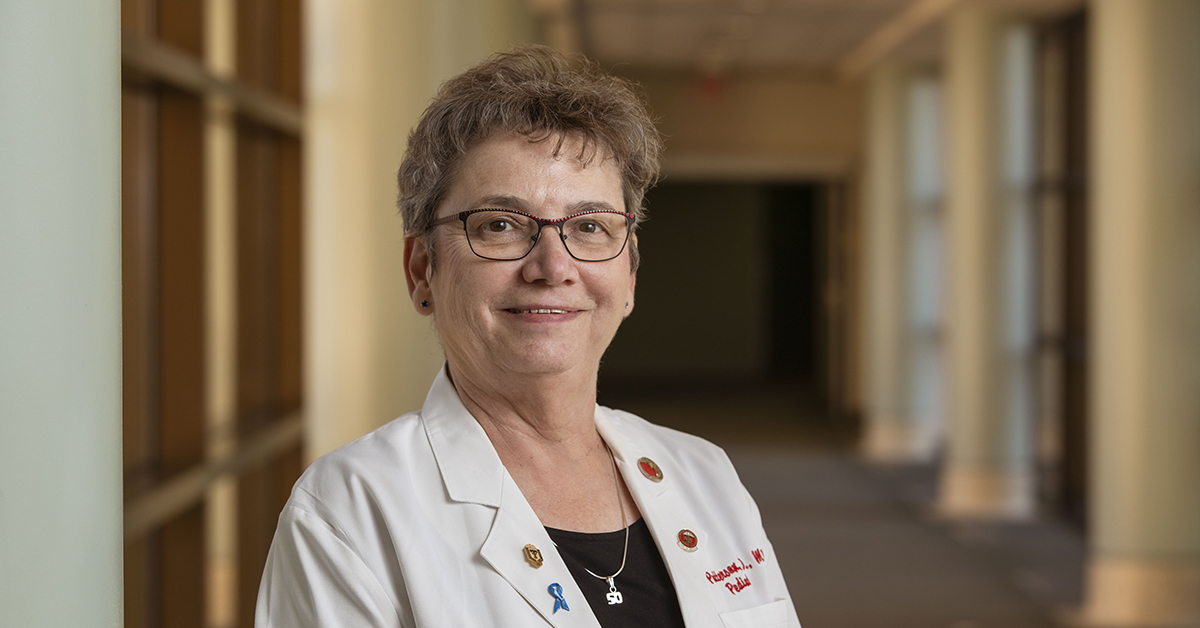TTUHSC Expert Believes Parents Can Help Their Children by First Helping Themselves

Just months ago, families were gathered together to enjoy the holidays and all the trimmings of the season. Now, as spring blooms, many of those same families find themselves again sharing the same space, though for a much different reason.
The spread of COVID-19, the novel coronavirus that has spawned a global pandemic, also has transformed the dynamics in many households. Children, used to the more structured life of school, may be experiencing fear, anxiety and boredom. Parents, accustomed to dealing with work-related tasks from office buildings, warehouses, trucks or other job settings now must meet job responsibilities with homebound children in the adjoining room.
Without proper strategies for dealing with such a sudden shift in daily routines, the situation can become a source of stress and anxiety for everyone. To better navigate the unfamiliar waters, Patti Patterson, M.D., MPH, a pediatrician at the Texas Tech University Health Sciences Center, said parents can more effectively help children manage the conditions by productively addressing their own mental well being.
“The parents are stressed as well; there's financial pressures and all kinds of things going on, so they need to take care of themselves,” Patterson said. “Take a little bit of time, even a little walk, whatever you can do to be sure that you're healthy because if you're not healthy, there's no way you can take good care of your kids.”
Though an infant or toddler may not understand the situation, they can sense when mom or dad is upset or on edge. Preschoolers may have the verbal skills to better communicate feelings of concern, but their apprehension level also ebbs and flows based upon signals they receive from caregivers.
Providing these younger children with consistent reassurance can help alleviate their anxiety. Patterson said to acknowledge the pandemic, but also let children know that they, their family and their pets will have plenty of food, medicine and other essentials required to stay safe and secure.
Older children, especially teens, often take their cues from social media or TV as much or more than they do from parents. To deal with the onslaught of facts, opinions and everything in between, Patterson recommended limiting their exposure to these types of communication.
“Get good information, but limit it,” Patterson said. “Spend more time just talking, finding games to play, being involved with the kids and reassuring them as much as you can.”
Adolescents and teens also may not be accustomed to spending all their time with family and may lash out when they aren’t allowed to hang out at the mall or socialize with their friends. Patterson said parents should be cognizant of the frustrations this can cause for children in this age range and look for positive ways to communicate.
“Kids can really pluck your nerves as you're trying to do things with them,” Patterson said. “Everybody's not accustomed to being together and kids get anxious and are maybe not
understanding why things are the way they are. Sometimes that frustration is going to come at the parent.”
When frustration levels threaten to spill over, parents and adult caregivers can often diffuse the situation by remaining calm and examining their own feelings. Patterson likes to read small devotional guides, poems or scripture before she meditates. Others may opt to reset their emotions by utilizing one of the mindfulness apps like Calm, Headspace and Aura which have recently become popular. Many of these apps are free to download and are available for both iOS and Android devices.
“It sounds kind of simplistic, but it really does help, particularly if you have a partner,” Patterson maintained. “You and your spouse can talk about these things and you can share those responsibilities. It can really be helpful.”
Patterson said www.healthychildren.org, a website provided by the American Academy of Pediatrics, is a good resource for parents seeking tips and information about dealing with child- related stress. For those who are getting so frustrated that they are concerned about being able to appropriately and safely take care of their kids, she suggested they contact the Child Help Hotline at www.childhelp.org or 1-800-4-A-Child.
“That's a really good resource; there will be live counselors there who can help you, and they also provide counselors in several languages,” she added. “Just because you may be getting frustrated at some of the things that are going on, that doesn't mean you're a bad parent. It means that you're a normal person just trying to deal with extraordinary circumstances.”
The world is indeed a different place than it was just months or even weeks ago, but children are still looking for direction and cues from the adults in the lives. The concept of social distancing dictates we stay away from other people, including those we are used to seeing daily at school and work. However, Patterson said, it doesn't mean people have to increase the sense of isolation by locking themselves and their children in their homes.
“It's okay to go to the park, but avoid touching stuff, avoid being around other people,” she emphasized. “If you want to go for a walk, that's great; it's not just staying in the room all the time, which of course is going to become depressing. The weather was fantastic yesterday; get out and walk, go out in the backyard and play with the dog. All those things are great things mentally and just good for you. Sunshine can be very helpful.”
